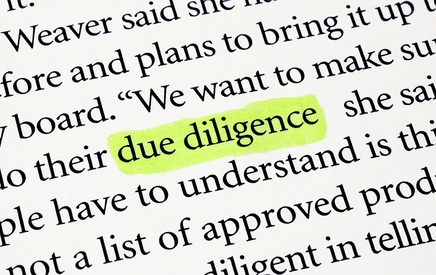Financial Services, Sectors - Written by Barry & Richard on Sunday, September 18, 2011 23:23 - 0 Comments
Transparency International UK – Corporate due diligence consultation & proportionality
 Last week the Transparency International (TI) consultation on guidance for anti-bribery due diligence in mergers, acquisitions and investments closed. A copy of the draft guide is can be accessed here.
Last week the Transparency International (TI) consultation on guidance for anti-bribery due diligence in mergers, acquisitions and investments closed. A copy of the draft guide is can be accessed here.
Transparency International is a force for good and perform invaluable work in the anti-corruption community. We read publications put out by TI with great interest.
The draft due diligence guide sets out what TI believe to be best practice in the context of due diligence on investment and Mergers and Acquisitions transactions.
The draft guide states: “This guidance relates to mergers, acquisitions (M&A) and investments of any size.” [our emphasis]
The document includes very useful guidance which is worth considering in the run up to undertaking a transaction.
However, we would be concerned if there was a suggestion that the recommendations in the TI draft should be considered the minimum which a business undertake before any M&A deal or investment.
Due diligence is a critical part of Adequate Procedures.
But, as Howard Sklar once eloquently put it, just how much diligence is due?
This will depend on a range of factors from the business sector in which the target (and the acquirer) operates through to the locations in which the target operates and everything in between including how much time and access an acquirer or investor actually has.
We certainly advocate that Anti-Bribery & Corruption due diligence is undertaken but what is appropriate in the acquisition of a business with a few employees operating exclusively in say, the UK, will differ from that required in relation to a global corporation with operations in various jurisdictions at the bottom of the TI corruption perception index.
Add to this different transaction scenarios. For example, on a hostile takeover it is likely only very limited information will be available. Similarly, in a competitive bid situation with a data room and hard deadlines the ability to conduct exhaustive due diligence is likely to be limited in practice.
So, while the importance of due diligence in undertaking transactions should not be underestimated, the practical reality of doing deals should not be forgotten.
A point the SFO themselves acknowledge. We met with Richard Alderman earlier in the year and asked him the SFO’s position given that transactions often have to be undertaken with very little time and reported on it back in June.
We have extracted some salient passages:
June 6, 2011 – extract from thebriberyact.com
“A key problem from an M&A standpoint is time.
There often isn’t any.
Deals sometimes need to be done in a very short time frame without the luxury of a full due diligence procedure. The risk of these “quick and dirty deals” is often (but not always) priced in.
How does that fit with a Bribery Act requirement to undertake Bribery due diligence as part of Adequate Procedures to prevent bribery?
We posed the question. Richard Alderman’s response was pragmatic.
Subject to one proviso, he said that if there simply is not time then the SFO would not seek to penalise an ethical acquirer.
The proviso is that the SFO would expect a corporate which bought a business in a hurry to undertake post acquisition due diligence. If that diligence revealed bribery problems then the SFO would expect the problems to be resolved.
This may include liaising with the SFO about the problems uncovered, the proposals to fix them and the compliance programme going forward.
In many ways this approach mirrors the approach outlined by the US DOJ in the recent Johnson & Johnson Deferred Prosecution Agreement which had this to say on the subject of acquistions:
“new business entities are only acquired after thorough [Foreign Corrupt Practices Act (FCPA)] and anticorruption due diligence by legal, accounting, and compliance personnel. Where anticorruption due diligence is not practicable prior to acquisition of a new business for reasons beyond [the acquirer’s] control, or due to any applicable law, rule, or regulation, [the acquirer] will conduct FCPA and anticorruption due diligence subsequent to the acquisition and report to the [DOJ] any corrupt payments, falsified books and records, or inadequate internal controls…[the acquirer should ensure that] policies and procedures regarding the anticorruption laws and regulations apply as quickly as is practicable, but in any event no less than one year post-closing, to newly-acquired businesses, and will promptly:
a. Train directors, officers, employees, agents, consultants, representatives, distributors, joint venture partners, and relevant employees thereof, who present corruption risk to [the acquirer], on the anticorruption laws and regulations and [the acquirers’s] related policies and procedures; and
b. Conduct an FCPA-specific audit of all newly-acquired businesses within 18 months of acquisition.”
Richard Alderman also mentioned in passing that the formal SFO procedure in relation to M&A transactions is a little used procedure. It may be that this is because it could throw a deal timetable off track. However in appropriate circumstances it should also be considered.”
The reality is that each specific transaction will need to be looked at individually and the level of due diligence which is “due” and possible before the deal is done considered on a case by case basis.
As was always the case before the Bribery Act, the investor or acquirer will ultimately have to take a commercial decision on any deal balancing risk and a variety of other factors when considering whether to do a deal, in what timeframe and for how much.
That hasn’t changed. The Bribery Act and anti-corruption risk is simply something else to factor in.


